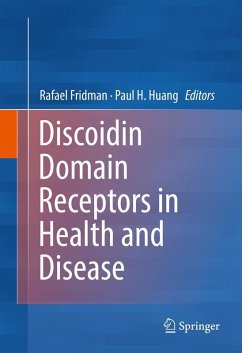The interactions of cells with their surrounding extracellular matrix (ECM) plays a pivotal role in driving normal cell behavior, from development to tissue differentiation and function. At the cellular level, organ homeostasis depends on a productive communication between cells and ECM, which eventually leads to the normal phenotypic repertoire that characterize each cell type in the organism. A failure to establish these normal interactions and to interpret the cues emanating from the ECM is one of the major causes in abnormal development and the pathogenesis of multiple diseases. To recognize and act upon the biophysical signals that are generated by the cross talk between cells and ECM, the cells developed specific receptors, among them a unique set of receptor tyrosine kinases (RTKs), known as the Discoidin Domain Receptors (DDRs). The DDRs are the only RTKs that specifically bind to and are activated by collagen, a major protein component of the ECM. Hence, the DDRs are part of the signaling networks that translate information from the ECM, and thus they are key regulators of cell-matrix interactions. Under physiological conditions, DDRs control cell and tissue homeostasis by acting on collagen sensors; transducing signals that regulate cell polarity, tissue morphogenesis, cell differentiation, and collagen deposition. DDRs play a key role in diseases that are characterized by dysfunction of the stromal component, which lead to abnormal collagen deposition and the resulting fibrotic response that disrupt normal organ function in disease of the cardiovascular system, lungs and kidneys, just to mention a few. In cancer, DDRs are hijacked by tumor and stromal cells to disrupt normal cell-collagen communication and initiate pro-oncogenic programs. Importantly, several cancer types exhibit DDR mutations, which are thought to alter receptor function, and contribute to cancer progression. Therefore, the strong causative association between altered RTK functionand disease it is been translated today in the development of specific tyrosine kinase inhibitors targeting DDRs for various disease conditions. In spite of the accumulating evidence highlighting the importance of DDRs in health and diseases, there is still much to learn about these unique RTKs, as of today there is a lack in the medical literature of a book dedicated solely to DDRs. This is the first comprehensive volume dedicated to DDRs, which will fill a gap in the field and serve those interested in the scientific community to learn more about these important receptors in health and disease.
Dieser Download kann aus rechtlichen Gründen nur mit Rechnungsadresse in A, B, BG, CY, CZ, D, DK, EW, E, FIN, F, GR, HR, H, IRL, I, LT, L, LR, M, NL, PL, P, R, S, SLO, SK ausgeliefert werden.









